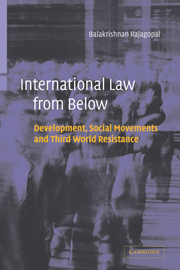Book contents
- Frontmatter
- Contents
- Abbreviations
- Preface and Acknowledgments
- Introduction
- PART I International law, development, and Third World resistance
- 1 Writing Third World resistance into international law
- 2 International law and the development encounter
- PART II International law, Third World resistance, and the institutionalization of development: the invention of the apparatus
- PART III Decolonizing resistance: human rights and the challenge of social movements
- PART IV Epilogue
- References
- Index
1 - Writing Third World resistance into international law
from PART I - International law, development, and Third World resistance
Published online by Cambridge University Press: 09 July 2009
- Frontmatter
- Contents
- Abbreviations
- Preface and Acknowledgments
- Introduction
- PART I International law, development, and Third World resistance
- 1 Writing Third World resistance into international law
- 2 International law and the development encounter
- PART II International law, Third World resistance, and the institutionalization of development: the invention of the apparatus
- PART III Decolonizing resistance: human rights and the challenge of social movements
- PART IV Epilogue
- References
- Index
Summary
Provided the imperial power is itself prepared to set the pace for self-government and does not have to be forced out by pressure from below, the legacies of the past can quickly be transformed from a serious handicap in world affairs into a priceless diplomatic and political advantage.
That is the partial tragedy of resistance, that it must to a certain extent work to recover forms already established or at least influenced or infiltrated by the culture of empire.
There are several themes that run through this book which attempt to rethink Third World resistance to international law. Let me outline some of them here. First, a straightforward Saidian theme: when international law, as a cultural category, encounters resistance, it can engage with it only by adopting certain unchanging essences of western or Third World-ness, as well as images of legitimacy and redemption. The result of this can be seen in the ways in which certain types of resistance are chosen as legitimate and certain other types are not in international law, and the power that makes this choice possible. This can be seen, for example, in the invisibility of Third World environmental movements to progressive Third World legal scholarship or in the attribution of the success of public enterprises (town and village enterprises or TVEs) in China to kinship ties (rather than economic rationality) by the World Bank.
- Type
- Chapter
- Information
- International Law from BelowDevelopment, Social Movements and Third World Resistance, pp. 9 - 23Publisher: Cambridge University PressPrint publication year: 2003



